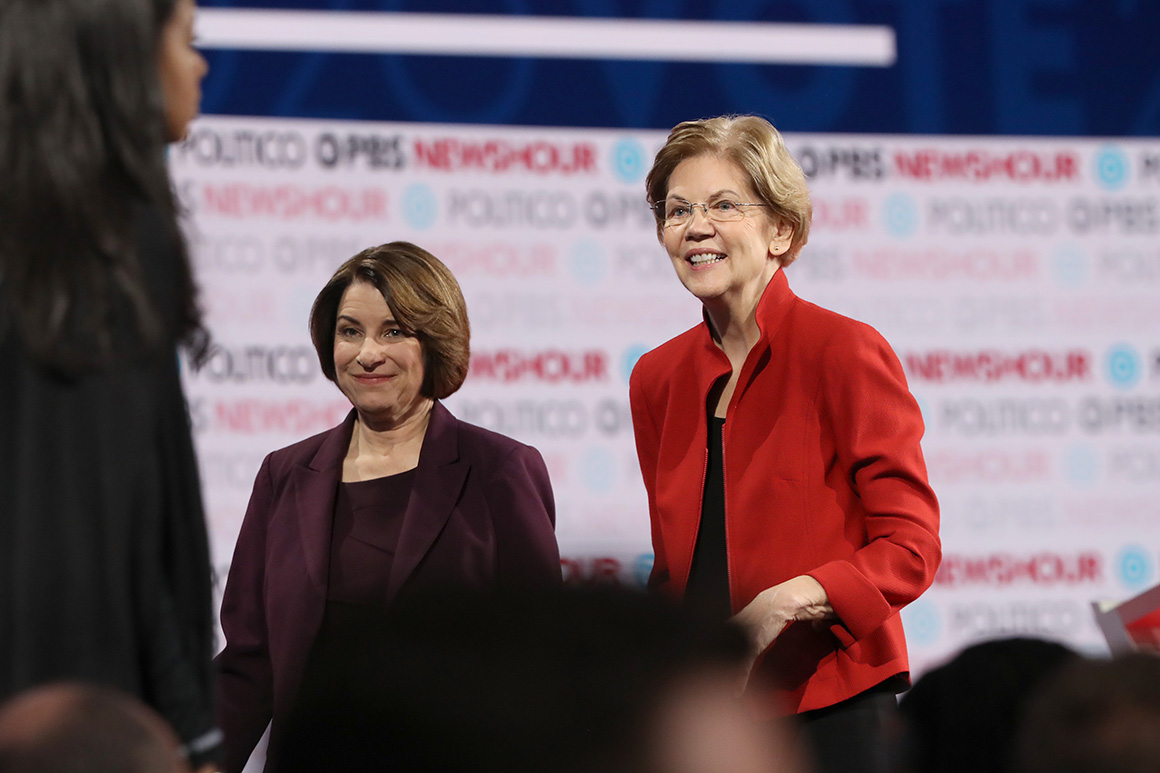
“I think it’s true individual candidates have done sexist things, often unwittingly,” said Brian Fallon, Clinton’s press secretary in 2016. “But calling out individuals as sexist is more prone to have people ignore the bigger thing they’re pointing out and saying, ‘Oh, that’s divisive.’”
Klobuchar has been more willing to call out “double standards” for women in the primary. In recent weeks she’s ramped up her criticism of a system that’s never elected a woman president, though Clinton did handily win the popular vote. Klobuchar often ties it to her own pitch on electability: her record of winning statewide in Minnesota, a swing state where she’s drawn support deep into Trump counties.
On Sunday night, she reminded more than 100 voters gathered here during a snowstorm that while Democrats “better not screw this up.” But she added, “If you don’t think a woman can beat Donald Trump, Nancy Pelosi does it every single day,” a line she had previously deployed in a debate.
“I never intended to, nor am I running on it, running on, ‘Oh, elect a woman.’ … When Obama was going to be the first African American president, he did not [play up] that very much,” Klobuchar said. “[But] as you can see by some of these numbers in polls, what people are hearing on the ground, I still think it’s a major factor. And sometimes I think people aren’t really even realizing it in their head, and I think they need to grapple with it and we need to make the case.”
Still, there are risks for both candidates because “you don’t want to be seen as the candidate who is complaining, which complicates how you can call out sexism,” said Ian Sams, the national press secretary for Kamala Harris’ presidential campaign. “Walking that fine line — identifying it without being seen as playing the victim card — is very hard to do, and what they’re dealing with now.”
Warren and Klobuchar’s differences in strategy also signal their positions in the primary.
“Amy Klobuchar is playing a hot hand right now as she’s trying to get into that top tier, but she has nothing to lose. Elizabeth Warren sat at the top of this for a very long time, and when you’re at the top, you’re very cautious,” said Sue Dvorsky, a former Iowa Democratic Party chairwoman who initially endorsed Harris. “They’re just in different places in the race, and that explains some of their differences in willingness to address it until this point.”
Though a debate over sexism burst through the primary this week, it’s been a persistent force that’s shaped the Democratic primary since its earliest days, aides for several campaigns acknowledged. Biden described Warren as “angry” in a Medium post in October and MSNBC commentator Donny Deutsch chastised her for a “high school principal demeanour,” both seen as sexist tropes. Amy Klobuchar’s campaign launch in February was consumed by headlines about her treatment of staff, which her defenders believed wouldn’t have been levied against or portrayed in the same way with a tough male boss.
At Kirsten Gillibrand’s first news conference as a presidential candidate, she was asked about her likability. During a Fox News town hall, she was chastised for being impolite. And last spring, Harris, who faced the challenge of running as a black woman, had to defuse rumors that she’d become Biden’s running mate. A whisper campaign about the No. 2 role circled around Harris even though she was running for the top job herself, shaping perceptions of her candidacy.
Source: politico.com
See more here: news365.stream






